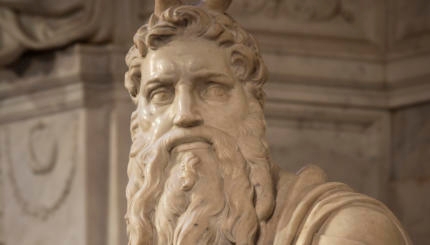Commentary on Parashat Beha'alotcha, Numbers 8:1-12:16
Every week, Julie Seltzer, artist and scribe, bakes a depicting an aspect of the week’s Torah portion.
But now our soul is dried away; there is nothing at all; we have nothing save this man(na) to look to. (Numbers 11:6)
וְעַתָּה נַפְשֵׁנוּ יְבֵשָׁה, אֵין כּל–בִּלְתִּי, אֶל-הַמָּן עֵינֵינוּ

These challot are question marks, representing the two portions of manna received before in the desert. The word “manna” comes from the Hebrew word “man,” meaning “what.” The manna gets its name because the people asked what this substance was.

Help us keep Jewish knowledge accessible to millions of people around the world.
Your donation to My Jewish Learning fuels endless journeys of Jewish discovery. With your help, My Jewish Learning can continue to provide nonstop opportunities for learning, connection and growth.


